外研版(2019)选择性必修第四册Unit5 Into the unknown-Starting out课件(13张PPT)
文档属性
| 名称 | 外研版(2019)选择性必修第四册Unit5 Into the unknown-Starting out课件(13张PPT) |

|
|
| 格式 | zip | ||
| 文件大小 | 49.5MB | ||
| 资源类型 | 教案 | ||
| 版本资源 | 外研版(2019) | ||
| 科目 | 英语 | ||
| 更新时间 | 2022-06-17 00:00:00 | ||
图片预览

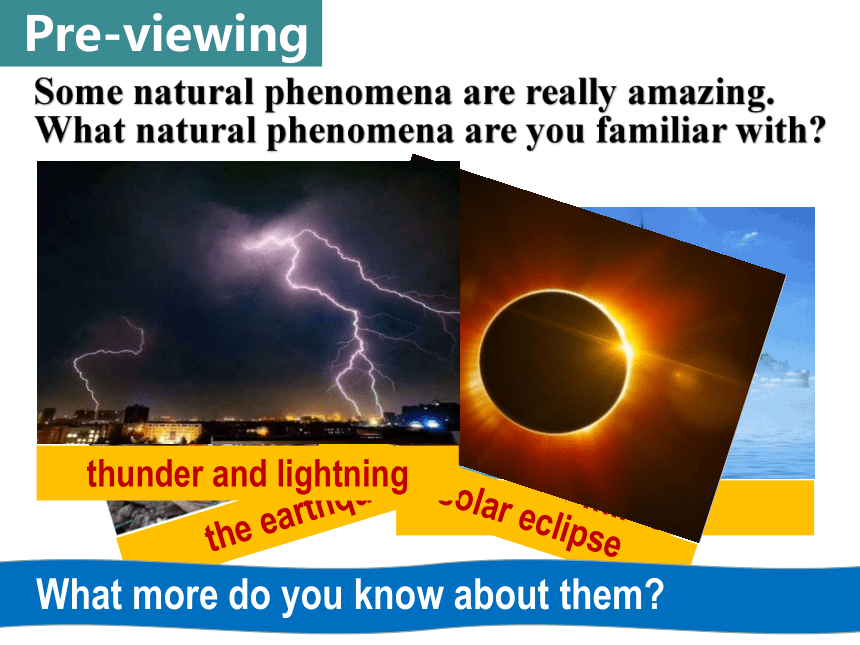
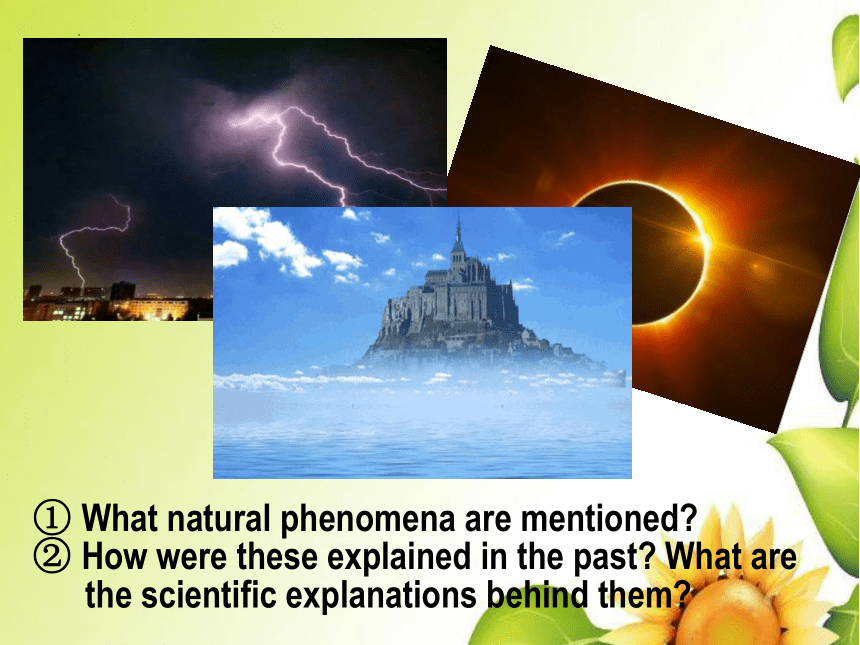
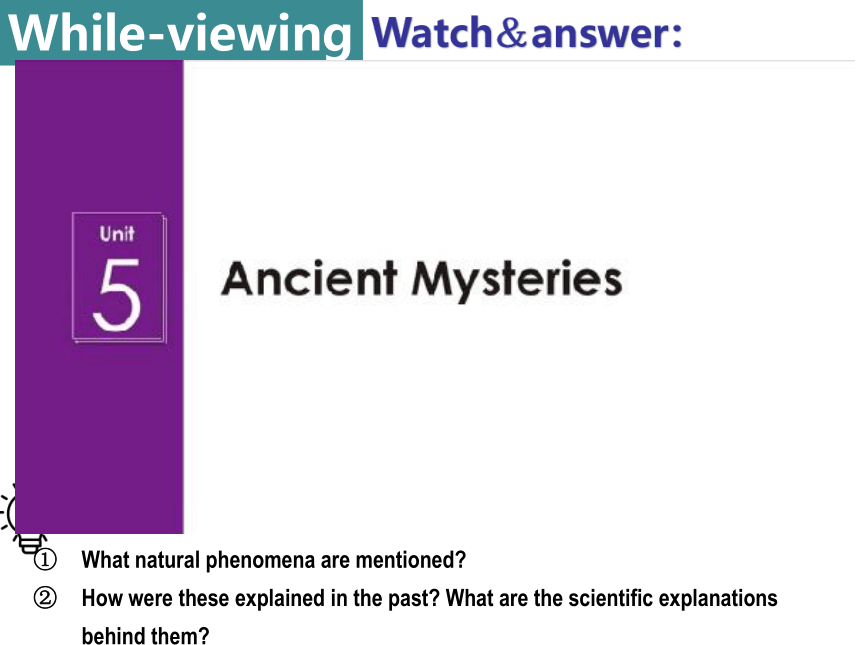
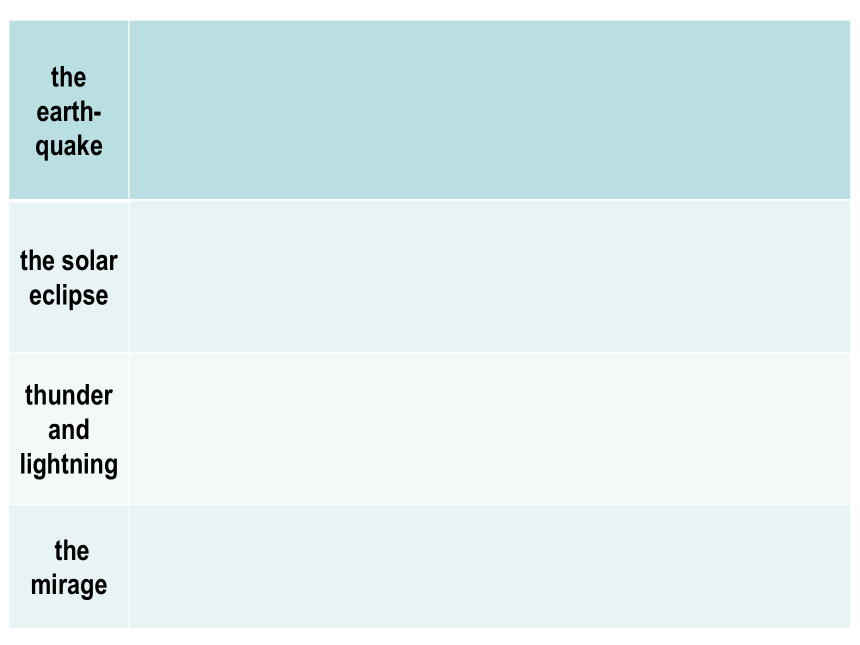
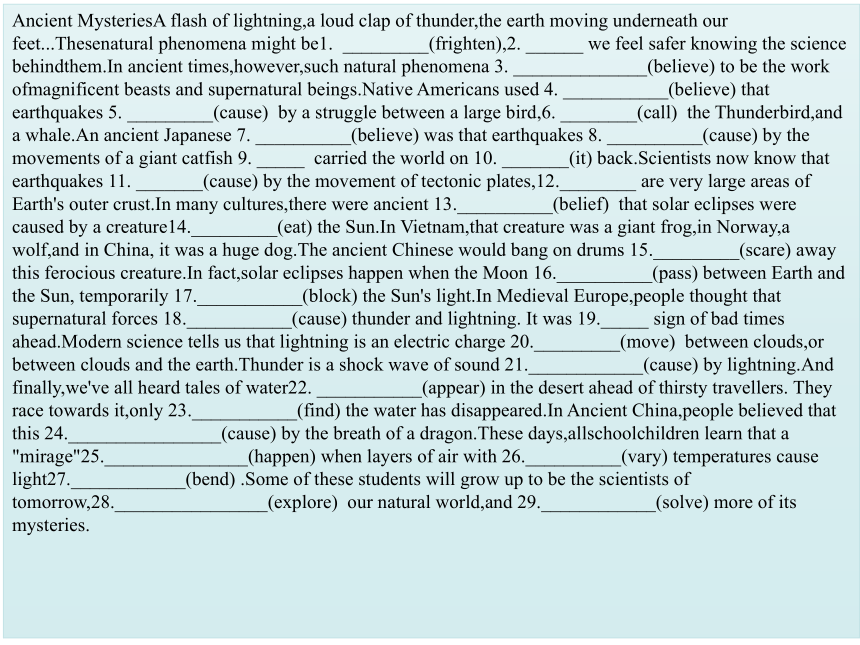
文档简介
(共13张PPT)
Starting out
新外研选择性必修Book 4
Unit 5 Into the unknown
Pre-viewing
Some natural phenomena are really amazing. What natural phenomena are you familiar with
the earthquake
the mirage
the solar eclipse
thunder and lightning
What more do you know about them
What natural phenomena are mentioned
How were these explained in the past What are
the scientific explanations behind them
While-viewing
Watch&answer:
What natural phenomena are mentioned
How were these explained in the past What are the scientific explanations behind them
the earth-quake Native Americans used to believe that earthquakes were caused by a struggle between a large bird, called the Thunderbird, and a whale. An ancient Japanese belief was that earthquakes were caused by the movements of a giant catfish that carried the world on its back. Scientists now know that earthquakes are actually caused by the movement of tectonic plates.
the solar eclipse In many cultures, there were ancient beliefs that solar eclipses were caused by a creature eating the Sun. In Vietnam, that creature was a giant frog, in Norway, a wolf, and in China, it was a huge dog. In fact, solar eclipses happen when the Moon passes between Earth and the Sun, temporarily blocking the Sun’s light.
thunder and lightning In Medieval Europe, people thought that supernatural forces caused thunder and lightning. It was a sign of bad times ahead. Modern science tells us that lightning is an electric charge moving between clouds, or between clouds and the earth. Thunder is a shock wave of sound caused by lightning.
the mirage In Ancient China, people believed that this was actually caused by the breath of a dragon. These days, people know that a “mirage” happens when layers of air with varying temperatures cause light to bend.
Ancient MysteriesA flash of lightning,a loud clap of thunder,the earth moving underneath our feet...Thesenatural phenomena might be1. _________(frighten),2. ______ we feel safer knowing the science behindthem.In ancient times,however,such natural phenomena 3. ______________(believe) to be the work ofmagnificent beasts and supernatural beings.Native Americans used 4. ___________(believe) that earthquakes 5. _________(cause) by a struggle between a large bird,6. ________(call) the Thunderbird,and a whale.An ancient Japanese 7. __________(believe) was that earthquakes 8. __________(cause) by the movements of a giant catfish 9. _____ carried the world on 10. _______(it) back.Scientists now know that earthquakes 11. _______(cause) by the movement of tectonic plates,12.________ are very large areas of Earth's outer crust.In many cultures,there were ancient 13.__________(belief) that solar eclipses were caused by a creature14._________(eat) the Sun.In Vietnam,that creature was a giant frog,in Norway,a wolf,and in China, it was a huge dog.The ancient Chinese would bang on drums 15._________(scare) away this ferocious creature.In fact,solar eclipses happen when the Moon 16.__________(pass) between Earth and the Sun, temporarily 17.___________(block) the Sun's light.In Medieval Europe,people thought that supernatural forces 18.___________(cause) thunder and lightning. It was 19._____ sign of bad times ahead.Modern science tells us that lightning is an electric charge 20._________(move) between clouds,or between clouds and the earth.Thunder is a shock wave of sound 21.____________(cause) by lightning.And finally,we've all heard tales of water22. ___________(appear) in the desert ahead of thirsty travellers. They race towards it,only 23.___________(find) the water has disappeared.In Ancient China,people believed that this 24.________________(cause) by the breath of a dragon.These days,allschoolchildren learn that a "mirage"25._______________(happen) when layers of air with 26.__________(vary) temperatures cause light27.____________(bend) .Some of these students will grow up to be the scientists of tomorrow,28.________________(explore) our natural world,and 29.____________(solve) more of its mysteries.
参考答案:1.frightening 2.but 3.were believed 4. to believe 5.were caused 6. called7. belief 8.were caused 9.that 10.its 11.are caused 12. which 13.beliefs 14. eating 15. to scare 16. passes 17.blocking 18.caused 19. a 20.moving 21. caused 22.appearing 23. to find 24.was caused 25.happens 26.happens 27. to bend 28.exploring 29.solving
After-viewing
What do you know about these mysteries
What other unsolved mysteries do you know of
Which of these do you most want to investigate
Atlantis
Atlantis is a legendary city, which is described in the work of the Greek philosopher Plato. The story of Atlantis with its fabulously wealthy and advanced civilisation which was swept into the sea to be lost for ever has captured the imagination of readers for over two millennia.
legendary / led nderi/
adj. 非常有名的,传说中的
fabulously / f bj l sli/ 难以置信的
civilisation n. 文明;文明社会
sweep swept swept 横扫
capturev. 俘获,捕获;夺取,占领
millennia /m leni / 千年
Nazca lines
The Nazca Lines are a collection of giant geometric patterns and animal shapes. Drawn Into the landscapes of southern Peru, the majority of the lines are believed to be the work of the Nazca people around 1AD to 700. Designated a UNESCO World Heritage Site in 1994, numerous studies and theories have so far not explained the reason why the lines were created.
giant/ d a nt/ n. (传说中的)巨人
geometric / d i metr k/ adj. 几何图形的;几何的
majority /m d r ti/ n. 大多数
designate / dez ɡne t/ v. 把……定名为
numerous / nu m r s/ adj. 众多的,许多的
theory/ θi ri/ n. 学说,理论
gravitational/ ɡr v te nl/ adj. [力] 重力的,[力] 引力的
Tunguska event通古斯大爆炸
Tunguska event, enormous explosion that is estimated to have occurred at 7: 14 am plus or minus one minute on 30 June 1908, at an altitude of 5-10 kilometres, flattening some 2,000 square kilometres and charring more than 100 square kilometres of pine forest near thle Podkamennaya Tunguska River in Central Siberia, Russia.
enormous / n rm s/ adj. 巨大的,极大的
explosion/ k splo n/ n. 爆破,爆炸
estimate / est me t/ v. 估计;判断,评价
plus /pl s/ prep. 加;外加,而且
minus / ma n s/ prep. 减,减去,负的
at an altitude of海拔高度有……
flatten / fl tn/ v. (使)变平
char /t ɑ r/ v. (使)烧焦
pine forest松林
acceleration / k sel re n/ n. 加速,加快
Black hole
A black hole is a region of space-time exhibiting gravitational acceleration so strong that nothing, not even light, can escape from it.
Thank you!
Starting out
新外研选择性必修Book 4
Unit 5 Into the unknown
Pre-viewing
Some natural phenomena are really amazing. What natural phenomena are you familiar with
the earthquake
the mirage
the solar eclipse
thunder and lightning
What more do you know about them
What natural phenomena are mentioned
How were these explained in the past What are
the scientific explanations behind them
While-viewing
Watch&answer:
What natural phenomena are mentioned
How were these explained in the past What are the scientific explanations behind them
the earth-quake Native Americans used to believe that earthquakes were caused by a struggle between a large bird, called the Thunderbird, and a whale. An ancient Japanese belief was that earthquakes were caused by the movements of a giant catfish that carried the world on its back. Scientists now know that earthquakes are actually caused by the movement of tectonic plates.
the solar eclipse In many cultures, there were ancient beliefs that solar eclipses were caused by a creature eating the Sun. In Vietnam, that creature was a giant frog, in Norway, a wolf, and in China, it was a huge dog. In fact, solar eclipses happen when the Moon passes between Earth and the Sun, temporarily blocking the Sun’s light.
thunder and lightning In Medieval Europe, people thought that supernatural forces caused thunder and lightning. It was a sign of bad times ahead. Modern science tells us that lightning is an electric charge moving between clouds, or between clouds and the earth. Thunder is a shock wave of sound caused by lightning.
the mirage In Ancient China, people believed that this was actually caused by the breath of a dragon. These days, people know that a “mirage” happens when layers of air with varying temperatures cause light to bend.
Ancient MysteriesA flash of lightning,a loud clap of thunder,the earth moving underneath our feet...Thesenatural phenomena might be1. _________(frighten),2. ______ we feel safer knowing the science behindthem.In ancient times,however,such natural phenomena 3. ______________(believe) to be the work ofmagnificent beasts and supernatural beings.Native Americans used 4. ___________(believe) that earthquakes 5. _________(cause) by a struggle between a large bird,6. ________(call) the Thunderbird,and a whale.An ancient Japanese 7. __________(believe) was that earthquakes 8. __________(cause) by the movements of a giant catfish 9. _____ carried the world on 10. _______(it) back.Scientists now know that earthquakes 11. _______(cause) by the movement of tectonic plates,12.________ are very large areas of Earth's outer crust.In many cultures,there were ancient 13.__________(belief) that solar eclipses were caused by a creature14._________(eat) the Sun.In Vietnam,that creature was a giant frog,in Norway,a wolf,and in China, it was a huge dog.The ancient Chinese would bang on drums 15._________(scare) away this ferocious creature.In fact,solar eclipses happen when the Moon 16.__________(pass) between Earth and the Sun, temporarily 17.___________(block) the Sun's light.In Medieval Europe,people thought that supernatural forces 18.___________(cause) thunder and lightning. It was 19._____ sign of bad times ahead.Modern science tells us that lightning is an electric charge 20._________(move) between clouds,or between clouds and the earth.Thunder is a shock wave of sound 21.____________(cause) by lightning.And finally,we've all heard tales of water22. ___________(appear) in the desert ahead of thirsty travellers. They race towards it,only 23.___________(find) the water has disappeared.In Ancient China,people believed that this 24.________________(cause) by the breath of a dragon.These days,allschoolchildren learn that a "mirage"25._______________(happen) when layers of air with 26.__________(vary) temperatures cause light27.____________(bend) .Some of these students will grow up to be the scientists of tomorrow,28.________________(explore) our natural world,and 29.____________(solve) more of its mysteries.
参考答案:1.frightening 2.but 3.were believed 4. to believe 5.were caused 6. called7. belief 8.were caused 9.that 10.its 11.are caused 12. which 13.beliefs 14. eating 15. to scare 16. passes 17.blocking 18.caused 19. a 20.moving 21. caused 22.appearing 23. to find 24.was caused 25.happens 26.happens 27. to bend 28.exploring 29.solving
After-viewing
What do you know about these mysteries
What other unsolved mysteries do you know of
Which of these do you most want to investigate
Atlantis
Atlantis is a legendary city, which is described in the work of the Greek philosopher Plato. The story of Atlantis with its fabulously wealthy and advanced civilisation which was swept into the sea to be lost for ever has captured the imagination of readers for over two millennia.
legendary / led nderi/
adj. 非常有名的,传说中的
fabulously / f bj l sli/ 难以置信的
civilisation n. 文明;文明社会
sweep swept swept 横扫
capturev. 俘获,捕获;夺取,占领
millennia /m leni / 千年
Nazca lines
The Nazca Lines are a collection of giant geometric patterns and animal shapes. Drawn Into the landscapes of southern Peru, the majority of the lines are believed to be the work of the Nazca people around 1AD to 700. Designated a UNESCO World Heritage Site in 1994, numerous studies and theories have so far not explained the reason why the lines were created.
giant/ d a nt/ n. (传说中的)巨人
geometric / d i metr k/ adj. 几何图形的;几何的
majority /m d r ti/ n. 大多数
designate / dez ɡne t/ v. 把……定名为
numerous / nu m r s/ adj. 众多的,许多的
theory/ θi ri/ n. 学说,理论
gravitational/ ɡr v te nl/ adj. [力] 重力的,[力] 引力的
Tunguska event通古斯大爆炸
Tunguska event, enormous explosion that is estimated to have occurred at 7: 14 am plus or minus one minute on 30 June 1908, at an altitude of 5-10 kilometres, flattening some 2,000 square kilometres and charring more than 100 square kilometres of pine forest near thle Podkamennaya Tunguska River in Central Siberia, Russia.
enormous / n rm s/ adj. 巨大的,极大的
explosion/ k splo n/ n. 爆破,爆炸
estimate / est me t/ v. 估计;判断,评价
plus /pl s/ prep. 加;外加,而且
minus / ma n s/ prep. 减,减去,负的
at an altitude of海拔高度有……
flatten / fl tn/ v. (使)变平
char /t ɑ r/ v. (使)烧焦
pine forest松林
acceleration / k sel re n/ n. 加速,加快
Black hole
A black hole is a region of space-time exhibiting gravitational acceleration so strong that nothing, not even light, can escape from it.
Thank you!
